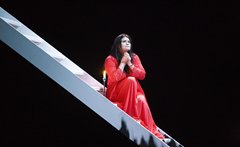Is Macbeth a prisoner of fate or in charge of his own destiny? Will the prophecies be fulfilled regardless of what he does, or could he resist the witches’ tempting words and his ambitious wife’s pressure? In Opera Ireland’s new production of Verdi’s first adaptation of a Shakespearian play, Macbeth does not have much of a choice: after his first encounter with the witches, three of them morph into domestic servants and join him at Dunsinane, observing and manipulating proceedings there. Not only do they operate the two mobile wall elements that create the interiors and surroundings of the castle, they also provide the dagger with which Duncan is killed and are responsible for Banquo’s apparition.
Placing the story in a twentieth-century dictatorship, Dieter Kaegi’s production creates some visually powerful and convincing scenes, particularly in the choral tableaux featuring the witches and the exiles. This, however, involves a trade-off, as the witches’ choruses appear musically weaker and less secure than other choral scenes, mainly due to their constant movement (leaving them partly facing away from the audience). In the opening scene, three of them produce a number of red ribbons (reminiscent of the norns spinning the thread of life in Götterdämmerung), in which Macbeth gets hopelessly entangled.  The witches’ hands and arms – the only parts of their bodies we get to see – are red too, while this colour later becomes associated with Lady Macbeth: she only ever wears red costumes. This makes her the visually dominating character, with everybody around her appearing almost colourless in different shades of black, grey or brown. Only Macbeth – now getting deeper and deeper entangled in the web of crime and sin – over time acquires a few accessories in his wife’s colour, but never reaches her level of viciousness and cunning.
The witches’ hands and arms – the only parts of their bodies we get to see – are red too, while this colour later becomes associated with Lady Macbeth: she only ever wears red costumes. This makes her the visually dominating character, with everybody around her appearing almost colourless in different shades of black, grey or brown. Only Macbeth – now getting deeper and deeper entangled in the web of crime and sin – over time acquires a few accessories in his wife’s colour, but never reaches her level of viciousness and cunning.
In order to turn Shakespeare’s play into an opera, Verdi and his librettist Piave had to cut large sections of the text and eliminate many minor characters. As a result, some events are only reported briefly or left unexplained altogether, as Verdi could assume that his audience would be familiar with the play. Dieter Kaegi’s production bridges some of these gaps, for example by showing Lady Macbeth raising suspicion against Malcolm during the first act’s final chorus, thus motivating his otherwise unexplained flight to England. On the other hand, Verdi also added some scenes, including the chorus of Scottish exiles (like its counterpart in Nabucco, mainly addressing an Italian audience longing for the re-unification of their homeland.)
This thoughtful and provocative Macbeth – one of Opera Ireland’s most convincing productions in recent times – provides the best possible argument in favour of the company’s work and the continuation of regular, fully staged opera performances in Dublin.
Musically the production relies on two very strong lead singers. Michele Capalbo’s Lady Macbeth embodies the ambitioned schemer as well as the secretly insecure and guilt-ridden sinner with equal aplomb; her highlight is the sleepwalking scene with its huge dynamic and expressive contrasts. Her strong voice dominates her scenes as much as her singular colour, albeit occasionally at the expense of precision. She enjoys acting as much as singing. Bruno Caproni’s Macbeth has perhaps his greatest moment right after the sleepwalking scene, when he prepares for battle with Malcolm’s and Macduff’s forces. His warm yet powerful baritone sounds perhaps a little less black and 'evil' than might be expected, but this fits perfectly into a production that presents him less as a Scottish Scarpia or Mazeppa but rather as a marionette operated by the forces around him. It also makes him quite convincing in his more lyrical moments, or when confronted with supernatural forces.
The supporting cast is led by Valerian Ruminski’s Banquo and Kamen Chanev’s Macduff. The former excelled in the second-act aria preceding his murder (although sometimes with a slightly uneven projection), while the latter’s highlight was the moving lament of his slain family. The RTÉ Concert Orchestra relishes the challenge of Verdi’s arousing and emotional score. Led by the energetic and precise Marco Zambelli, it overcame a few initial insecurities to not only provide the singers with a secure foundation, but also add its share to the magic on stage during scenes like the apparition of the future kings in the third act.
At a time of economic downturn and budget cuts everywhere, this thoughtful and provocative Macbeth – one of Opera Ireland’s most convincing productions in recent times – provides the best possible argument in favour of the company’s work and the continuation of regular, fully staged opera performances in Dublin.
Wolfgang Marx is Lecturer in Music at University College Dublin.
A concert production of Das Rheingold by Richard Wagner was presented alongside Macbeth for Opera Ireland's autumn 2009 season. Originally planned as a fully staged production, Das Rheingold was scaled down due to budgetary cuts.